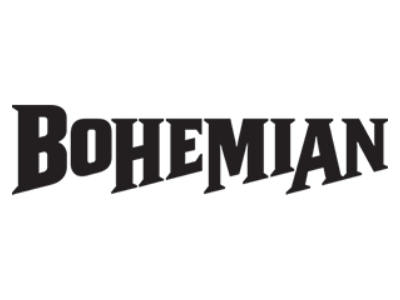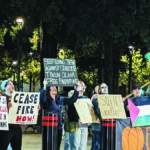It has been nearly three months since the bombs started falling on my people in Gaza. Palestinians love life and love each other.
Every one of them is my sibling; every one of them is my aunt or uncle, my cousin, friend, neighbor, classmate or teacher. Our connections go so deep and are so strong that when one of us is hurting, all of us are hurting.
On the 15th of October, I grabbed my Palestinian flag and headed down to Old Courthouse Square in Santa Rosa to show my support. The North Coast Coalition for Palestine and Jewish Voices for Peace had co-organized a protest against the then week-long attack Israel had launched on Gaza after the Palestinian resistance attack on the 7th of October. There were roughly 150 locals there: Palestinians, anti-Zionist Jews and conscientious people of many different backgrounds. There, at the square during that first protest, I and about a dozen others came together to coordinate our next steps and plan for future actions.
In the short time since that day, I have met so many amazing people who I wish I had met years ago and under different circumstances. They have given me support, friendship and love and have taught me so much about myself and about life. Times like these necessitate and facilitate trust and loyalty and openness among comrades. I became curious about why this is so important to the others who I have been working with during these few months.
To get some answers, I asked my colleagues what they had been motivated by.
Rachel is an anti-Zionist Jewish woman who I’ve known for several years and has been active on many social justice issues since long before I knew her. Her answer to my question about why she spends so much time and effort organizing around this issue was, “I think all of us who are organizing are just horrified by what’s happening and heartbroken, and it’s so painful to watch the news and to see the relentless murder of so many people. Our role at this time is really to shift public opinion.”
She added, “The Zionist narratives that Jewish people grow up learning about blocks them from seeing the horrors that are going on and seeing how Palestinians have been displaced from their land and their homes and are constantly under attack.”
Another friend, Tess, said, “I was raised in a Christian community, and the beliefs that I was taught in Christian school were not aligned with what I was taught at home.”
Tess’ great-grandparents were from Denmark and were part of the resistance movement against the Nazis. “There’s no way I could do anything else because my grandmother did not tell me these stories just for me to put them in my head and let them be there. She told me those stories so that I could spot oppression and fascism and occupation when I see it, and that’s why I’m here.”
Another friend I spoke with was Ronni, who is a young Mexican-American queer person. They said, “I first became aware of what has been happening in Palestine starting October 7th. …I just sat with my discomfort and used that opportunity to educate myself about what was happening. And just kind of realizing the history of how Israel came to be and how it’s at the expense of the Palestinians. It’s a clear issue.”
There is so much more that I learned from these conversations that is so valuable, but I will have to leave that for another time. The most important thing I learned is that Palestine has opened people’s eyes to the possibility of living in a more just and peaceful world. Palestine has freed the world, and now it is time for the world to come together and free Palestine.
Tarik Kanaana was born in Palestine, works in nutrition and childcare, and lives in Santa Rosa.


